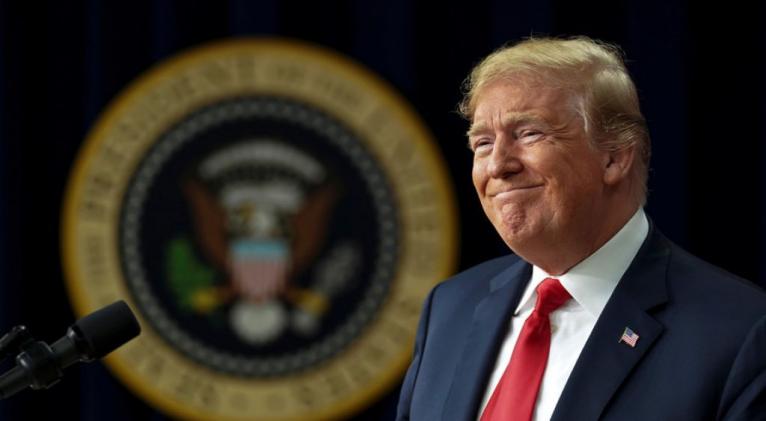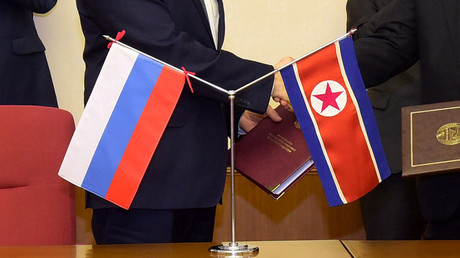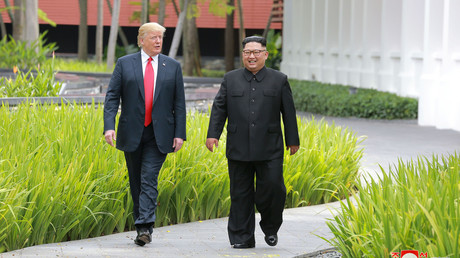Trump the peacekeeper? US leader brags that America would be ‘in war’ with N. Korea 'if not for him
especiales

US President Donald Trump has once again baffled the international community, as he claimed that it was him who actually saved the world from a potentially devastating conflict between Washington and Pyongyang.
“If not for me, we would now be at War with North Korea!” Trump said in a Twitter post on Tuesday as he rejoiced the “many good conversations with North Korea,” which he said are “going well.” He then apparently also took the credit for the absence of any North Korean missile launches and nuclear tests over the last eight months.
Pyongyang indeed ceased its nuclear and missile activities for quite some time, although it remains doubtful whether it was actually a result of the US “maximum pressure” policy, which was so adamantly championed by Trump not so long ago. When the situation around the Korean Peninsula heated up following the North’s nuclear and missile tests in early September 2017, the US leader actually opted for open confrontation, albeit only verbally, rather than for diplomatic efforts.
In October 2017, he actually declared all talks with Pyongyang were pointless, as he said that “only one thing will work,” while lambasting the then-US State Secretary Rex Tillerson for “wasting his time trying to negotiate with the Little Rocket Man” – a derogatory nickname Trump coined for North Korean leader Kim Jong-un.
The US leader then repeatedly said that “talking is not the answer” to the Korean crisis, adding that “talk of appeasement” will not “work” with North Korea, and he even resorted to open threats of war. Speaking at the annual General Debate of the 72nd session of the UN General Assembly back in September 2017, Trump famously said that the US “will have no choice but to totally destroy North Korea,” if forced to defend itself and its allies. He also warned that Washington would not hesitate to use its “nuclear capabilities” to defend itself and its allies.
Russia has repeatedly warned the US against taking military action against North Korea, advocating for a diplomatic approach instead. Russia’s Foreign Ministry particularly called on the US and its major ally in the region, South Korea, to take “adequate steps” and reduce their military activity in the region to avoid further escalation. While supporting a number of UN Security Council sanctions on North Korea, Moscow cautioned that the US-led drills are “provoking” Kim Jong-un into striving for new weapons.
In September 2017, Moscow and Beijing put forward a ‘double freeze’ plan calling for a simultaneous halt to North Korea’s tests and the US’ war games in the region. However, Washington ignored these calls and continued its maximum pressure and a bellicose line at that time.
Even when Pyongyang engaged in the first direct negotiations with Seoul over two years in early 2018, Trump was still full of skepticism and ready to resort to a military option. “I am not sure that talks will lead to anything meaningful,” he said at that time, adding that it was “very possible” that the standoff with North Korea might not be resolved peacefully.
At some points, the US president was so carried away by his war of words with the North Korean leader that it resulted in some blunders. On one such occasion, Trump famously bragged that his nuclear button was “much bigger and more powerful” than Kim Jong-un's.
North Korea also initially did not hesitate to issue belligerent statements, as it also threatened to “annihilate” the US and turn it into “ashes,” as well as to “sink” Japan and “wipe out” South Korea. However, it was Pyongyang that eventually decided to halt its nuclear and missile tests while Kim Jong-un sent a personal invitation to Trump to discuss the possible denuclearization of the Korean Peninsula.
It was only after the negotiations between two Koreas turned out to be largely successful and they were actually followed by the first meeting between the North and South Korean leaders since 2007, that Trump suddenly changed his rhetoric. He jumped from mocking the North Korean leader to calling him “very honorable.”
This trend continued after the historic meeting between the US and North Korean leaders in Singapore. Following the talks, Trump declared that there was “no longer a nuclear threat from North Korea,” and actually praised Kim’s leadership and said that they had a “very good relationship,” as well as “good chemistry.”
Still, the US president also claimed back in April that it was his “maximum pressure” approach that actually worked. In fact, though, it seems that it was actually the “double freeze” plan, advocated by Russia and China from the very beginning of the recent Korean crisis, that the US and North Korean leaders followed to at least start to resolve their differences.















Add new comment